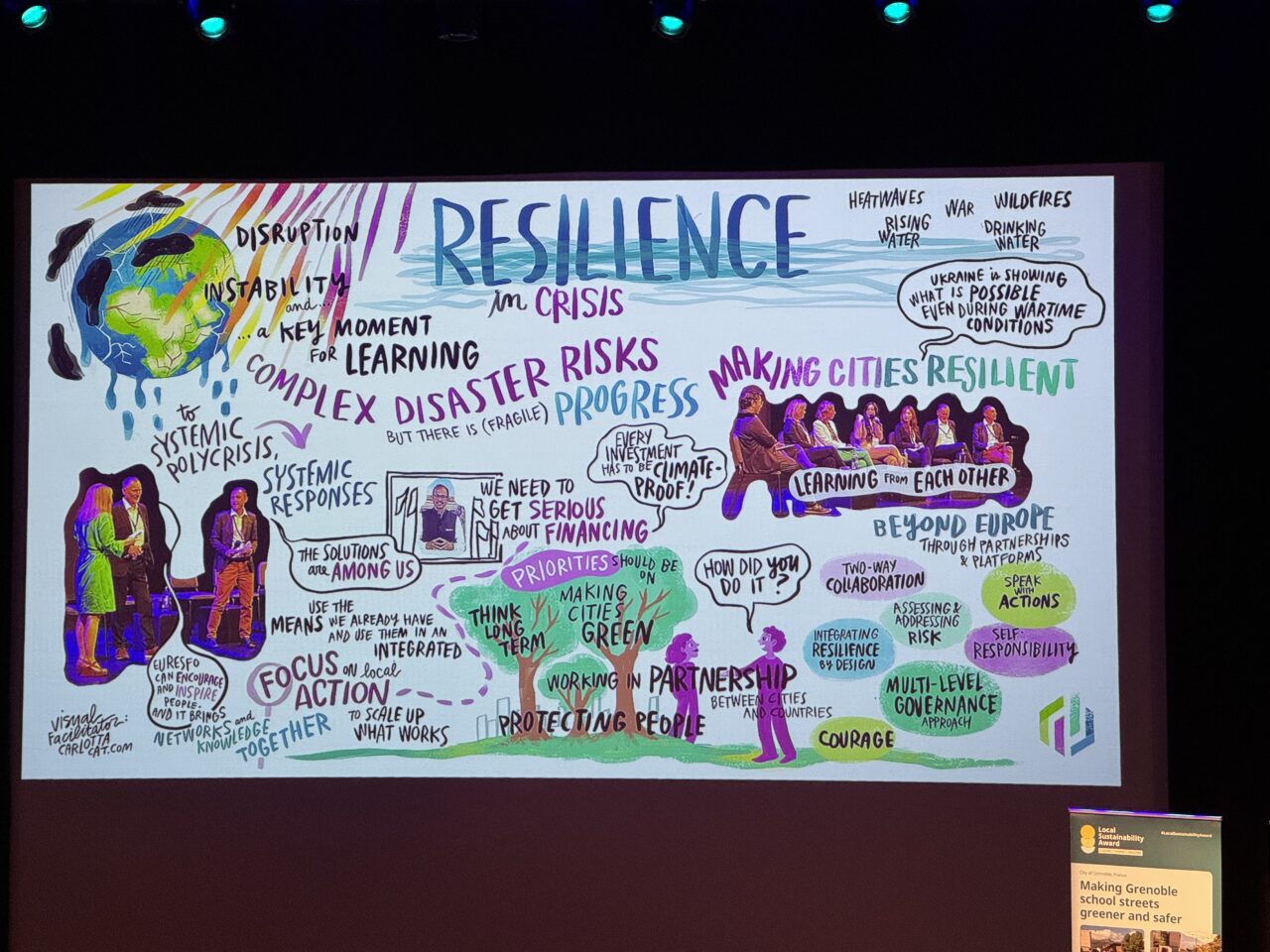Selling Umbrellas in the Sunshine: MULTICLIMACT at EURESFO 2025
30/06/2025 | News, Blogs

MULTICLIMACT project at the 12th European Urban Resilience Forum (EURESFO), co-organised by MULTICLIMACT, leading voices from cities, academic circles, public and private sector called for urgent, systemic climate adaptation. Drawing on powerful plenary visuals and the unveiling of the CREMA tool, the forum highlighted the need to move from pilot projects to scalable, people-centred resilience strategies. As one speaker aptly put it: “It might not be a bad idea to sell umbrellas in the sunshine.”
By Lucia Hörner
This quote, shared during the 12th edition of the European Urban Resilience Forum (EURESFO), beautifully captures the persistent challenge of securing support for climate adaptation before crises strike. MULTICLIMACT’s presence at EURESFO underlined this theme, as the project joined a diverse community of stakeholders all striving to move from planning to action in climate resilience.
Organised by our valued partner ICLEI Europe, the European Environment Agency (EEA) and the Gemeente Rotterdam, as well as co-organised this year by MULTICLIMACT Project, the 2025 edition focused on accelerating resilience action—a mission strongly aligned with the MULTICLIMACT project. For three days, from 25 to 27 June 2025, EURESFO 2025 brought together cities, researchers, and practitioners from public and private sector, such as architecture and urban planning, insurance and financing, as well as international organisations and EU representatives at LantarenVenster in Rotterdam, The Netherlands, to explore the complex, systemic responses required to face climate extremes. A key visual takeaway—depicted in the event’s vibrant graphic summaries by Carlotta Cat—was the metaphor of the city as a living organism. Maintaining its vital systems requires not only technical interventions but also cross-sector coordination, long-term thinking, and social resilience.
One of the plenary sessions titled “Building Urban Resilience in an Era of Polycrisis: The Holistic Agenda”, emphasised the importance of seeing cities through a systems lens—connecting spatial, social, economic, and environmental dimensions. “People need training in system thinking,” the speakers pointed out, highlighting a core challenge faced by cities: how to balance crisis response with visionary, integrated planning.
Another session, “Resilience Starts at Home: Advancing Affordable, Low- Emission and Climate-Adapted Housing in the EU”, centred on neighbourhood-level interventions. It showed how retrofitting homes and creating inclusive, climate-proof communities can generate co-benefits for health, the economy, and the environment. As MULTICLIMACT explores strategies to embed adaptation into local planning, this grassroots perspective is key.
Water resilience featured prominently in “Weathering the Future: Integrated Water Resilience Approaches”, where the consequences of floods, droughts, and extreme weather were addressed through an integrated approach. From green infrastructure to strategic flood risk management, the emphasis was on moving beyond temporary fixes and piloting towards scalable, long-term solutions.
In the session titled “Resilience in Crisis: Accelerating Action for a Just Future”, a powerful call captured the collective urgency for systemic change: “Stop piloting, upscale!” This call is resonating with MULTICLIMACT’s mission to move beyond experimentation and deliver transferable models across Europe.
During the lively Marketplace session at EURESFO 2025, Arianna Verga of RINA Consulting presented the CREMA tool—a strategic decision-support framework designed to enhance climate resilience in the built environment. As part of the bustling exhibition space, where participants explored an array of tools, assessments, and initiatives, CREMA tool stood out for its practical, step-by-step approach to evaluating vulnerabilities, assessing climate risks, and prioritising adaptation measures. MULTICLIMACT shared a stand with the Minority Report Project and also represented other projects from its wider cluster network, showcasing collective efforts to bridge research and implementation. The pitch drew strong interest from city representatives and practitioners eager for actionable methods to embed resilience thinking into local decision-making.
The forum reaffirmed several truths: adaptation is largely social, not just technical; funding remains a barrier; and more than innovation, we need pioneers implementing them. Cities shouldn’t wait for the storm to strike to realise they need an umbrella—they know it’s coming, and preparation must begin now. MULTICLIMACT aims to ensure they’re already holding one—ready and resilient, even when the sun is shining.
About MULTICLIMACT:
MULTICLIMACT is an EU-funded project aimed at safeguarding Europe’s built environment against the increasing threats of natural and climatic hazards. By uniting 25 leading European organisations, MULTICLIMACT aims to enhance resilience, sustainability, and safety for communities across the continent. Through innovative strategies, including a toolkit of 20 reliable methods and digital solutions, the project targets the urgent need for adaptive measures against floods, earthquakes, extreme weather conditions and heatwaves. Tested across four pilot sites with diverse climatic conditions, MULTICLIMACT embodies a shared vision for a safer, more resilient future, focusing on actions to reduce the impact of climate change on the built environment. For more information, please visit www.multiclimact.eu
Project Coordinator
Clemente Fuggini, RINA Consulting Spa
Main Press Contact
Alparslan Akkus, Steinbeis Europa Zentrum

